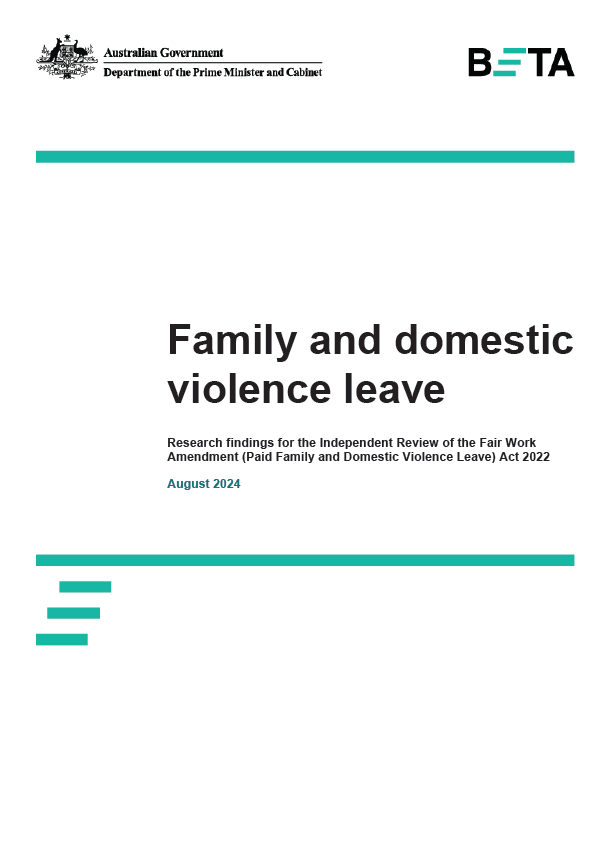BETA, in partnership with the Department of Employment and Workplace Relations, conducted research to understand the impact of the new entitlement for 10 days of paid family and domestic violence (FDV) leave.
We interviewed both FDV victim-survivors and employers, and surveyed 594 FDV victim-survivors, 1,437 employers and 3,008 other Australian workers.
Early indicators reveal that paid FDV leave has broad support and a meaningful impact. BETA found:
- Victim-survivors (90% of females and 79% of males), employers (77%) and workers (87%) were supportive of the paid FDV leave entitlement.
- The leave is being used as intended: to help employees experiencing FDV remain in work (89%), maintain income (91%) and access services. Victim-survivors used the leave to arrange for their (41%) or their children’s safety (43%), and access police (39%), medical (22%) and legal (24%) services.
- The leave entitlement has the potential to reduce workplace stigma. We gave Australian workers a scenario of a fictional victim-survivor taking FDV leave. Australian workers who first read about the leave entitlement evaluated the victim-survivor as more competent, more suitable for management, and assigned them a higher bonus than Australian workers who didn’t read about the entitlement.
BETA also identified opportunities to optimise implementation. BETA found:
- Uptake is constrained by low awareness, especially for and among casual staff.
- Employer-employee conversations are crucial, though concerns about privacy, trust, confidence, and the provision of evidence remain critical hurdles.
- Small and micro businesses feel the staffing implications and financial impacts more strongly.
Key takeaway: BETA found that the leave entitlement is providing meaningful support for victim-survivors in crisis and has the potential to reduce workplace stigma and discrimination.
ADDITIONAL TRIAL INFORMATION
Trial start and end dates: 23 February to 26 March 2024
Ethics approval: The ethical aspects of the survey experiment were reviewed and approved by Macquarie University’s Human Research Ethics Committee, Humanities & Social Sciences Committee (520241682255308) on 16 February 2024.
Research participants: A representative sample of 3,008 members of the Australian workforce population as recruited through an online survey panel.
Design: Two-arm randomised control trial via an online survey.
Interventions: Respondents read about the paid FDV leave entitlement either before (treatment condition) or after (control condition) they evaluated a fictional employee who took leave due to experiencing FDV.
Outcome measures:
The primary outcomes we measured were:
- Bonus (numeric): Respondents assigned the fictional employee a bonus in whole dollars between $0 and $1000, based on the fictional victim-survivor’s work performance.
- Management (binary): Respondents decided whether the fictional employee should be assessed for a management position in the next year (1 = yes, 0 = not yes).
Secondary outcome measures were:
- Competence rating: Respondents rated the fictional employee’s competence on a 6-item scale, each with a 6-point sliding response scale. The outcome was constructed as the mean of these responses.
- General stigma attitudes: Respondents indicated their level of agreement with a set of stigma-related statements that we had adapted from the Australia’s National Research Organisation for Women’s Safety (ANROWS) Gender Inequality Scale (AGIS) and the Attitudes towards Violence Against Women Scale (AVAWS).
The trial was pre-registered on the American Economic Association’s Social Science Registry: Family and Domestic Violence - Community attitudes>


